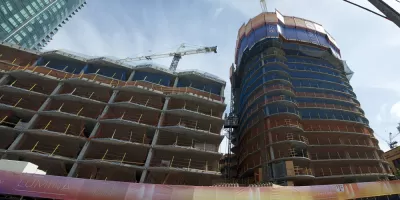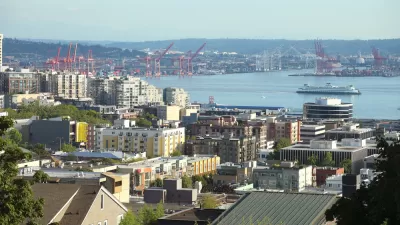While strict, suburban-style regulations often get a bad rap for the lack of housing in high demand cities, the red tape and other obstacles that delay development could be the worst culprit.

Dan Bertolet examines "one of the most important but overlooked causes of housing shortage: delay."
“Time is money,” goes the saying, and it’s the cardinal truth in the business of building homes. When a city’s regulations stretch the time from blueprint to move-in, the homes end up more expensive. Or they end up never built, because the delay makes them money-losers. In cities already suffering from a shortage of homes, either way, delay sends prices even higher.
Bertolet calls on existing research put a dollar figure to the cost of project approval delays in cities like Austin, San Francisco, and Seattle. In the latter's example, for a 135-unit apartment complex, "a two-month time reduction converts into a savings of $4,000 per unit."
Bertolet's analysis also digs into the issue of uncertainty, which is supposed to be a primary goal planning departments and land use regulations. Among examples of cities attempting to shorten time and increase certainty for development, Bertolet discusses the city of Portland's 2017 "Strategies for Accelerating Development," and the city of Seattle's expected changes to its design review process.
FULL STORY: HOUSING DELAYED IS HOUSING DENIED

Planetizen Federal Action Tracker
A weekly monitor of how Trump’s orders and actions are impacting planners and planning in America.

Restaurant Patios Were a Pandemic Win — Why Were They so Hard to Keep?
Social distancing requirements and changes in travel patterns prompted cities to pilot new uses for street and sidewalk space. Then it got complicated.

Map: Where Senate Republicans Want to Sell Your Public Lands
For public land advocates, the Senate Republicans’ proposal to sell millions of acres of public land in the West is “the biggest fight of their careers.”

Maui's Vacation Rental Debate Turns Ugly
Verbal attacks, misinformation campaigns and fistfights plague a high-stakes debate to convert thousands of vacation rentals into long-term housing.

San Francisco Suspends Traffic Calming Amidst Record Deaths
Citing “a challenging fiscal landscape,” the city will cease the program on the heels of 42 traffic deaths, including 24 pedestrians.

California Homeless Arrests, Citations Spike After Ruling
An investigation reveals that anti-homeless actions increased up to 500% after Grants Pass v. Johnson — even in cities claiming no policy change.
Urban Design for Planners 1: Software Tools
This six-course series explores essential urban design concepts using open source software and equips planners with the tools they need to participate fully in the urban design process.
Planning for Universal Design
Learn the tools for implementing Universal Design in planning regulations.
Heyer Gruel & Associates PA
JM Goldson LLC
Custer County Colorado
City of Camden Redevelopment Agency
City of Astoria
Transportation Research & Education Center (TREC) at Portland State University
Camden Redevelopment Agency
City of Claremont
Municipality of Princeton (NJ)





























